常用学科课程英语单词考点讲解与练习
- 格式:docx
- 大小:18.34 KB
- 文档页数:2
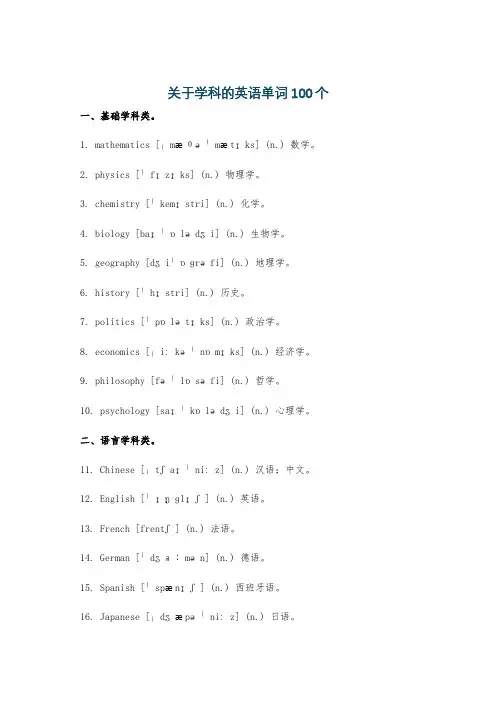
关于学科的英语单词100个一、基础学科类。
1. mathematics [ˌmæθəˈmætɪks] (n.) 数学。
2. physics [ˈfɪzɪks] (n.) 物理学。
3. chemistry [ˈkemɪstri] (n.) 化学。
4. biology [baɪˈɒlədʒi] (n.) 生物学。
5. geography [dʒiˈɒɡrəfi] (n.) 地理学。
6. history [ˈhɪstri] (n.) 历史。
7. politics [ˈpɒlətɪks] (n.) 政治学。
8. economics [ˌiːkəˈnɒmɪks] (n.) 经济学。
9. philosophy [fəˈlɒsəfi] (n.) 哲学。
10. psychology [saɪˈkɒlədʒi] (n.) 心理学。
二、语言学科类。
11. Chinese [ˌtʃaɪˈniːz] (n.) 汉语;中文。
12. English [ˈɪŋɡlɪʃ] (n.) 英语。
13. French [frentʃ] (n.) 法语。
14. German [ˈdʒɜːmən] (n.) 德语。
15. Spanish [ˈspænɪʃ] (n.) 西班牙语。
16. Japanese [ˌdʒæpəˈniːz] (n.) 日语。
17. Arabic [ˈærəbɪk] (n.) 阿拉伯语。
18. linguistics [lɪŋˈɡwɪstɪks] (n.) 语言学。
19. grammar [ˈɡræmə(r)] (n.) 语法。
20. vocabulary [vəˈkæbjələri] (n.) 词汇。
三、艺术学科类。
21. art [ɑːt] (n.) 艺术。
22. music [ˈmjuːzɪk] (n.) 音乐。
23. dance [dɑːns] (n.) 舞蹈。
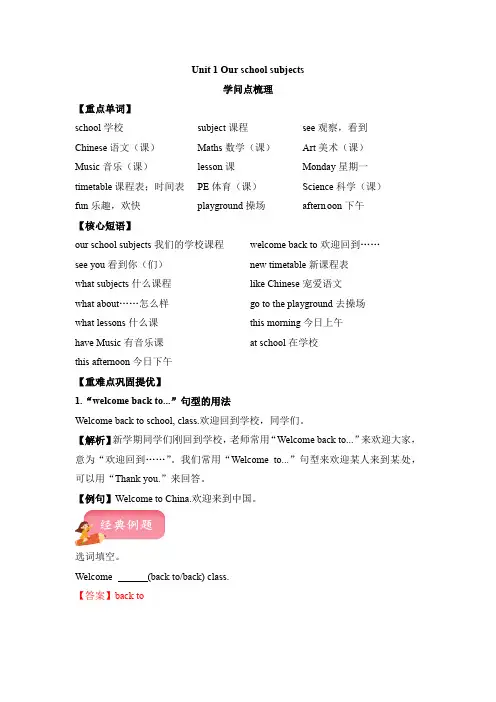
Unit 1 Our school subjects学问点梳理【重点单词】school学校subject课程see观察,看到Chinese语文(课)Maths数学(课)Art美术(课)Music音乐(课)lesson课Monday星期一timetable课程表;时间表PE体育(课)Science科学(课)fun乐趣,欢快playground操场aftern oon下午【核心短语】our school subjects我们的学校课程welcome back to欢迎回到……see you看到你(们)new timetable新课程表what subjects什么课程like Chinese宠爱语文what about……怎么样go to the playground去操场what lessons什么课this morning今日上午have Music有音乐课at school在学校this afternoon今日下午【重难点巩固提优】1.“welcome back to...”句型的用法Welcome back to school, class.欢迎回到学校,同学们。
【解析】新学期同学们刚回到学校,老师常用“Welcome back to...”来欢迎大家,意为“欢迎回到……”。
我们常用“Welcome to...”句型来欢迎某人来到某处,可以用“Thank you.”来回答。
【例句】Welcome to China.欢迎来到中国。
选词填空。
Welcome (back to/back) class.【答案】back to依据所给情景,选择合适的句子。
( )当你想欢迎从国外回来的爸爸时,你可以说:A.Welcome to China, Dad.B.Welcome back to China, Dad.【答案】B2.“What subjects do you like?”句型的用法What subjects do you like, Wang Bing?你宠爱什么课程,王兵?【解析】“What subjects do you like?”用来询问对方宠爱什么课程,其答语为“I like+科目名称.”。
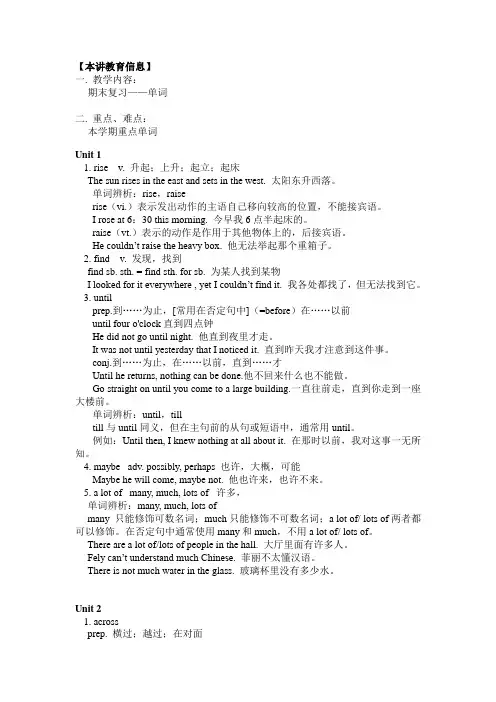
【本讲教育信息】一. 教学内容:期末复习——单词二. 重点、难点:本学期重点单词Unit 11. rise v. 升起;上升;起立;起床The sun rises in the east and sets in the west. 太阳东升西落。
单词辨析:rise,raiserise(vi.)表示发出动作的主语自己移向较高的位置,不能接宾语。
I rose at 6:30 this morning. 今早我6点半起床的。
raise(vt.)表示的动作是作用于其他物体上的,后接宾语。
He couldn‟t raise the heavy box. 他无法举起那个重箱子。
2. find v. 发现,找到find sb. sth. = find sth. for sb. 为某人找到某物I looked for it everywhere , yet I couldn‟t find it. 我各处都找了,但无法找到它。
3. untilprep.到……为止,[常用在否定句中](=before)在……以前until four o'clock直到四点钟He did not go until night. 他直到夜里才走。
It was not until yesterday that I noticed it. 直到昨天我才注意到这件事。
conj.到……为止,在……以前,直到……才Until he returns, nothing can be done.他不回来什么也不能做。
Go straight on until you come to a large building.一直往前走,直到你走到一座大楼前。
单词辨析:until,tilltill与until同义,但在主句前的从句或短语中,通常用until。
例如:Until then, I knew nothing at all about it. 在那时以前,我对这事一无所知。
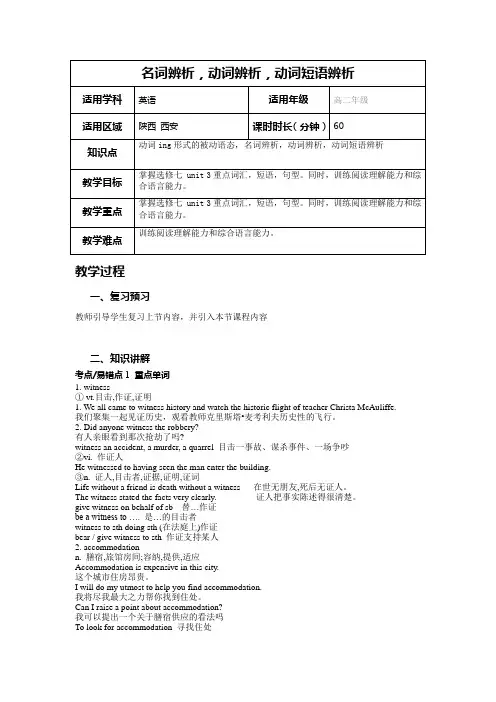
教学过程一、复习预习教师引导学生复习上节内容,并引入本节课程内容二、知识讲解考点/易错点1 重点单词1. witness① vt.目击,作证,证明1. We all came to witness history and watch the historic flight of teacher Christa McAuliffe. 我们聚集一起见证历史,观看教师克里斯塔•麦考利夫历史性的飞行。
2. Did anyone witness the robbery?有人亲眼看到那次抢劫了吗?witness an accident, a murder, a quarrel 目击一事故、谋杀事件、一场争吵②vi. 作证人He witnessed to having seen the man enter the building.③n. 证人,目击者,证据,证明,证词Life without a friend is death without a witness 在世无朋友,死后无证人。
The witness stated the facts very clearly. 证人把事实陈述得很清楚。
give witness on behalf of sb 替…作证be a witness to …. 是…的目击者witness to sth doing sth (在法庭上)作证bear / give witness to sth 作证支持某人2. accommodationn. 膳宿,旅馆房间;容纳,提供,适应Accommodation is expensive in this city.这个城市住房昂贵。
I will do my utmost to help you find accommodation.我将尽我最大之力帮你找到住处。
Can I raise a point about accommodation?我可以提出一个关于膳宿供应的看法吗To look for accommodation 寻找住处Provide food and accommodation for sb 向某人提供食宿3. abandonabandon vt. 抛弃,离弃,遗弃;放弃In his early days he abandoned medicine for literature.他早年弃医学文。
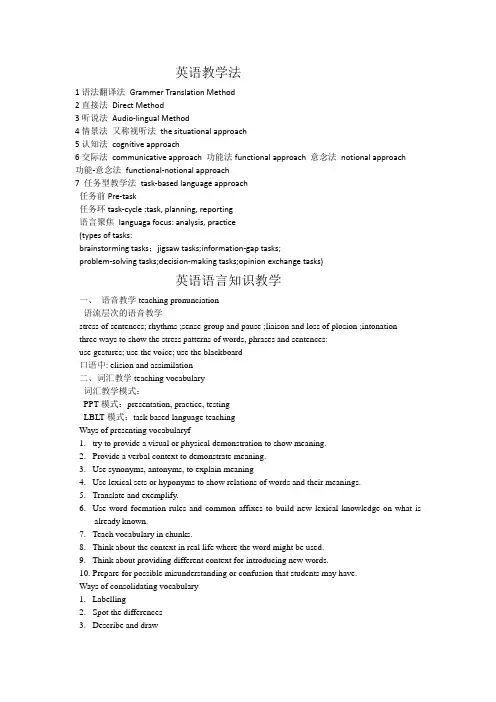
英语教学法1语法翻译法Grammer Translation Method2直接法Direct Method3听说法Audio-lingual Method4情景法又称视听法the situational approach5认知法cognitive approach6交际法communicative approach 功能法functional approach 意念法notional approach功能-意念法functional-notional approach7 任务型教学法task-based language approach任务前Pre-task任务环task-cycle :task, planning, reporting语言聚焦languaga focus: analysis, practice(types of tasks:brainstorming tasks;jigsaw tasks;information-gap tasks;problem-solving tasks;decision-making tasks;opinion exchange tasks)英语语言知识教学一、语音教学teaching pronunciation语流层次的语音教学stress of sentences; rhythms ;sense-group and pause ;liaison and loss of plosion ;intonation three ways to show the stress patterns of words, phrases and sentences:use gestures; use the voice; use the blackboard口语中: elision and assimilation二、词汇教学teaching vocabulary词汇教学模式:PPT模式:presentation, practice, testingLBLT模式:task based language teachingWays of presenting vocabularyf1.try to provide a visual or physical demonstration to show meaning.2.Provide a verbal context to demonstrate meaning.e synonyms, antonyms, to explain meaninge lexical sets or hyponyms to show relations of words and their meanings.5.Translate and exemplify.e word foemation rules and common affixes to build new lexical knowledge on what isalready known.7.Teach vocabulary in chunks.8.Think about the context in real life where the word might be used.9.Think about providing different context for introducing new words.10.Prepare for possible misunderstanding or confusion that students may have.Ways of consolidating vocabularybelling2.Spot the differences3.Describe and draw4.Play a gamee word series6.Word bingo7.Word association8.Find synonyms and antonyms9.Categoriesing word net-working the internet resources for more ideasDeveloping vocabulary learning strategies1.review regualry2.guess meaning from contextanize vocabulary effectivelye a dictionary5.manage strategy use三、语法教学:teaching grammer演绎法the deductive method归纳法the inductive method指导发现法the guided discovery method语法教学模式:行为主义语法教学presentation, explanation, practice, assessment任务型语法教学任务准备,设置语境呈现任务,任务执行,汇报,聚焦练习交际型语法教学:Presentation, practice, practice in contextPresentation, rehearsal, reportIntroduce, practice, produce/communicate语法练习方法Mechanical practice: substitutional drills; transformation drillsmeaningful practice;communicative practice四、语篇教学teaching discourse语篇教学方法整体教学法title, main idea, topic sentence1 Introduction (present situation)---background information—topic sentence—body (supporting detail)—short summary—opinion (prediction)—conclusion (suggestion/solution)—recommendation (calling for action)2 topic sentence—introduction (supporting detail)—thesis statement—topic sentence( major point one)—supporting detail—topic sentence(major point two)—supporting detail—conclusion(short summary)3 general introductory(remarks)—introduction—(narrowing controlling idea)—topic sentence—supporting detail(examples, reasons, arguments)—concluding remarks—conclusion(restatement of controlling idea)线索教学法5W+1H (who, when, where, why, what, how) 时间顺序chronological order背景知识教学法段落提问教学法1 关于主旨题的提问形式The article is mainly about…The main idea of this text may be…The author’s purpose in writing this text..Which of the following is the best title for the passage?Which statement best express the main idea of the paragraph?We can summarize the main idea that…2 关于文章细节Who, when, where, what, why, howWhich of the following is NOT true?According to the passage which of the following is NOT a statement?3 推断型The author implies that..The author suggests that..The tone of this article is…It can be infferred from the text that…4 作者观点类型的提问方式The author believes that…The author thinks that..According to the author…The author agrees with…The author gives his opinion that…The author’s point of view…讨论教学法英语语言技能教学一、听力教学Three teaching stages1 pre-listeningPre-listening activities should aim to motivate students, to active their prior knowledge, and to teach key words or key structures to the students before listening begins so that students are effectively, thematically and linguistically prepared for the listening task.(1)Predicting : teacher can help students by asking leading questions or letting them read thecomprehension questions(2)Setting the scene(3)Listening for the gist: in real life they will not be able to listen to something several times.(4)Listening for specific information: there are situations in real life where we listen only forsome specific information and ignore the rest of the entire messages.2 while-listening(1)No specific response. This can work well with stories or with any kind of materials that isintersting, humorous, or dramatic.(2)Listen and tick. If all the students need to do is tick items, the task will be much easier.(3)Listen and squence. Find out the order of things.(4)Listen and act. Listenning and responding physically to commands or directions.(5)Listen and draw. This type of activity works very well as an information gap activity betweenpairs of students.(6)Listen and fill. All you need to do is to decide which words to take out and replace withblanks.(7)Listen and notes. Listeners take notes while listening.3 post-reading(1)Multiple-choice questions.(2)Answering questions. Open-ended questions and inference questions can be asked.(3)Note-taking and gap-filling.(4)Dictogloss.听力技能训练活动1 辨音Identify the different phonemes;Mark stress, rhythm, meaning group, etc;Imitate; Repeat2 听主旨大意Select the appropriate topic;Creat a synopsis for the listening material构思内容梗概;Match the topic3. 听细节信息Fill in the diagram; choose true or false; answer questions;Put sentences in order according to the listening material;Ask questions about the main points;Put pictures in order after listening to stories;Matching task; dictation; draw pictures; act out4推理判断Choose true or false; answer questions; discuss questions5 猜测词义Ask questions about words and phrases in the listening material to check student s’ understanding Check students’ comprehension of word meanings by substituation;Ask questions on context and help students understand the target vocabulary;Analyze the structure of vocabulary;Analyze the flow of the listening material6 记笔记Spot dictation, compound dictation;Fill in the diagram; fill in the table7 识别交际信息Listen and circle the information;Listen and choose the appropriate information;Listen and match the explanations with the information;Listen and discuss二、口语教学口语教学方法3P模式presentation, practice, productionTBLT模式task-based language teaching: pre-task, while-task, post-task三、阅读教学Three stages of teaching reading1 pre-reading activities(1)Predicting: making reading more intriguing and purposeful.Predicting based on the title, vocabulary, the T/F questions(2)Setting the scene: discussing cultured-bound aspects of the text, relating what students alreadyknow to what they want to know, and use visual aids (real objects, pictures, photos, maps, video, multi-media materials)(3)Skimmning: getting the main idea of the text.(4)Scanning: locating specific information.2 While-reading activitiestraditional exploiting ways: multiple choice questions, T/F questions, open questions, paraphrasing, and translation.3 Post-reading activitiesPost-reading tasks enable students to produce language based on what they learned.PWP阅读教学模式Basic skills:Skimming 略读scanning 寻读Extensive reading 泛读intensive reading 精读四、写作教学A process approach to writing1creating a motivation to writing2brainstorming3mapping ; mapping help ss organize ideas4freewriting5outlining; write a more detailed outline.6Drafting7Editing8Revising9Proofreading10conferencing教学过程的安排Warmming-up 预热环节Leading-in 课堂导入Presentation 新知呈现Practice 课堂操练Consolidation 巩固拓展Summary and homework 总结与作业布置Principles for good lesson planningAim: the things that students are able to do by the end of the classVariety means planning a number of different types of activities and where possible, introducingstudents to a wide selection of materials so that learning is always interesting, motivating and never monotonous for the students.Flexibility means preparing some extra and alternative tasks and activities as the class does not always go according to the plan so that teacher always have options to cope with the unexpected situations rather than being the slaves of written plans or one methodology.Learnability means the contents and tasks planned for the lesson should be within the learning capability of the students. Doing things that are beyond or below the students’ coping ability will diminish their motivation.Linkage means the stages and steps with in each stage are planned in such a way that they are someway linked with each other.The role of the teacher:1 controller,2 assessor,3 organiser,4 prompter,5 participant, 6resource-provider,7 teacher’s new roles: teacher as facilitators, teacher as guides, teacher as researchersStudent grouping:Whole class work, group work, individual study。
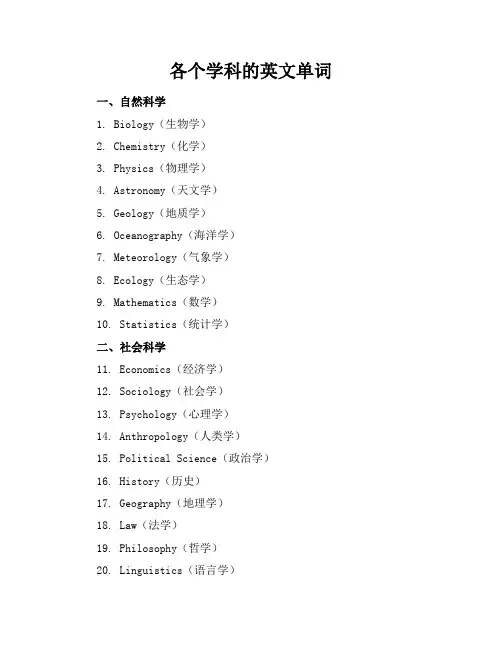
各个学科的英文单词一、自然科学1. Biology(生物学)2. Chemistry(化学)3. Physics(物理学)4. Astronomy(天文学)5. Geology(地质学)6. Oceanography(海洋学)7. Meteorology(气象学)8. Ecology(生态学)9. Mathematics(数学)10. Statistics(统计学)二、社会科学11. Economics(经济学)12. Sociology(社会学)13. Psychology(心理学)14. Anthropology(人类学)15. Political Science(政治学)16. History(历史)17. Geography(地理学)18. Law(法学)19. Philosophy(哲学)20. Linguistics(语言学)三、工程技术21. Engineering(工程学)22. Computer Science(计算机科学)23. Electrical Engineering(电气工程)24. Mechanical Engineering(机械工程)25. Civil Engineering(土木工程)26. Chemical Engineering(化学工程)27. Environmental Engineering(环境工程)28. Biomedical Engineering(生物医学工程)29. Aerospace Engineering(航空航天工程)30. Industrial Engineering(工业工程)四、艺术与人文31. Literature(文学)32. Art(艺术)33. Music(音乐)34. Dance(舞蹈)35. Theater(戏剧)36. Film Studies(电影研究)37. Architecture(建筑学)38. Religion(宗教)39. Classics(古典学)40. Cultural Studies(文化研究)五、医学与健康41. Medicine(医学)42. Nursing(护理学)43. Pharmacy(药学)44. Public Health(公共卫生)45. Nutrition(营养学)46. Sports Science(运动科学)47. Physiology(生理学)48. Anatomy(解剖学)49. Pathology(病理学)50. Immunology(免疫学)六、商业与管理51. Business Administration(工商管理)52. Marketing(市场营销)53. Finance(金融学)54. Accounting(会计学)55. Human Resources(人力资源管理)56. Management(管理学)57. Entrepreneurship(创业学)58. International Business(国际商务)59. Supply Chain Management(供应链管理)60. Project Management(项目管理)各个学科的英文单词七、教育与培训61. Education(教育学)62. Pedagogy(教学法)63. Curriculum Development(课程开发)64. Special Education(特殊教育)65. Adult Education(成人教育)66. Vocational Training(职业教育)67. Teacher Training(教师培训)68. Educational Psychology(教育心理学)69. Educational Technology(教育技术)70. Higher Education(高等教育)八、环境科学71. Environmental Science(环境科学)72. Conservation Biology(保护生物学)73. Sustainable Development(可持续发展)74. Climate Science(气候科学)75. Environmental Law(环境法学)76. Environmental Policy(环境政策)77. Environmental Economics(环境经济学)78. Urban Planning(城市规划)79. Environmental Engineering(环境工程)80. Environmental Sociology(环境社会学)九、农业科学81. Agronomy(农学)82. Horticulture(园艺学)83. Animal Science(动物科学)84. Soil Science(土壤科学)85. Plant Pathology(植物病理学). Agricultural Economics(农业经济学)87. Agricultural Engineering(农业工程)88. Food Science(食品科学)89. Fisheries Science(渔业科学)90. Forestry(林业)十、体育与运动91. Sports Science(运动科学)92. Exercise Physiology(运动生理学)93. Sports Psychology(运动心理学)94. Kinesiology(运动机能学)95. Physical Education(体育教育)96. Sports Medicine(运动医学)97. Athletic Training(运动训练)98. Coaching(教练学)99. Recreation(休闲学)100. Sports Management(体育管理)人文与社会科学1. Anthropology(人类学)2. Archaeology(考古学)3. Economics(经济学)4. Geography(地理学)5. History(历史学)6. Law(法学)7. Linguistics(语言学)8. Philosophy(哲学)9. Political Science(政治学)10. Psychology(心理学)11. Sociology(社会学)12. Anthropology(人类学)13. Archaeology(考古学)14. Economics(经济学)15. Geography(地理学)16. History(历史学)17. Law(法学)18. Linguistics(语言学)19. Philosophy(哲学)20. Political Science(政治学)21. Psychology(心理学)22. Sociology(社会学)23. Anthropology(人类学)24. Archaeology(考古学)25. Economics(经济学)26. Geography(地理学)27. History(历史学)28. Law(法学)29. Linguistics(语言学)30. Philosophy(哲学)31. Political Science(政治学)32. Psychology(心理学)33. Sociology(社会学)34. Anthropology(人类学)35. Archaeology(考古学)36. Economics(经济学)37. Geography(地理学)38. History(历史学)39. Law(法学)40. Linguistics(语言学)41. Philosophy(哲学)42. Political Science(政治学)43. Psychology(心理学)44. Sociology(社会学)45. Anthropology(人类学)46. Archaeology(考古学)47. Economics(经济学)48. Geography(地理学)49. History(历史学)50. Law(法学)51. Linguistics(语言学)52. Philosophy(哲学)53. Political Science(政治学)54. Psychology(心理学)56. Anthropology(人类学)57. Archaeology(考古学)58. Economics(经济学)59. Geography(地理学)60. History(历史学)61. Law(法学)62. Linguistics(语言学)63. Philosophy(哲学)64. Political Science(政治学)65. Psychology(心理学)66. Sociology(社会学)67. Anthropology(人类学)68. Archaeology(考古学)69. Economics(经济学)70. Geography(地理学)71. History(历史学)72. Law(法学)73. Linguistics(语言学)74. Philosophy(哲学)75. Political Science(政治学)76. Psychology(心理学)77. Sociology(社会学)78. Anthropology(人类学)80. Economics(经济学)81. Geography(地理学)82. History(历史学)83. Law(法学)84. Linguistics(语言学)85. Philosophy(哲学). Political Science(政治学)87. Psychology(心理学)88. Sociology(社会学)89. Anthropology(人类学)90. Archaeology(考古学)91. Economics(经济学)92. Geography(地理学)93. History(历史学)94. Law(法学)95. Linguistics(语言学)96. Philosophy(哲学)97. Political Science(政治学)98. Psychology(心理学)99. Sociology(社会学)100. Anthropology(人类学)。
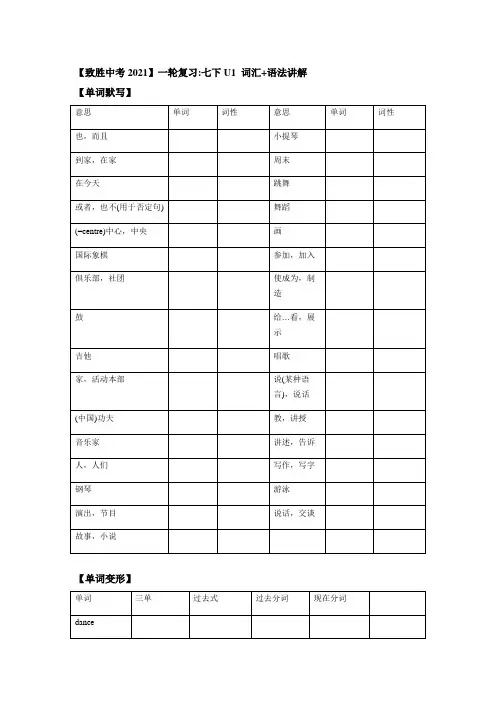
【致胜中考2021】一轮复习:七下U1 词汇+语法讲解【单词默写】【单词变形】【单词变性】center 名词变形容词______________ musician名词变名词______________ piano名词变名词______________ violin名词变名词______________ dance动词变名词______________ draw动词变名词______________ make动词变名词______________ sing动词变名词______________ speak动词变名词______________ teach动词变名词______________ write动词变名词______________【一词多义】1. home _____________ __________________ _________________He isn’t at home now.He didn't get home until 7 o’clock.The big grassland is home to most animals.2. show _________________ _________________ __________________ ________________ _______________The show tonight is of great success.Could you show me around your school?Please show your passport.He likes to show off what he has.He didn't show up until 7 o’clock.3. speak _____________ ________________ _______________Could you speak Chinese?Our teacher often speaks highly of Mary who won the first prize in many competitions.He wants to speak out the truth, but he can’t.4. tell ____________________ _____________________ ____________________ _____________________I will tell you a secret about myself tomorrow.My mother always told a story at night when I was a child.Could you tell the differences beween the two monkey king?【词汇用法】1. also: adv./放在句中,用于肯定句中近义词辨析: either vs. too vs. alsoeither: adv./放在句末,用于否定或疑问句too: adv./放在句末,用于肯定句中also: adv./放在句中,用于肯定句中2. or: 用于否定或疑问句中/并列连词/转折连词Would you like apples or bananas?Either you or him can go to the party.You can go to the park with him or go to the cinema with me?Hurry up, or you will be late.3. show: vt./show sb. sth./show sth. to sb./show up/show off/show sb. around/n./watch a show4. teach: vt./teach sb. sth./teach sth. to sb./teach oneself/teach sb. a lesson.同义词: teach oneself/learn by oneself5. write: vt./write a letter (with a pen/on a piece of paper)相关词辨析: say vs. read vs. writesay: There is a note saying:read: There is a note reading:write: There is a note written:6. talk: vi./talk about sth./talk with sb./talk to sb./n./have a talk with sb.近义词辨析:say: 说vt./say sth./sb. says/say to oneselfn. sayingtalk: 讨论,谈论,vi./talk with sb./talk to sb./talk about sth.n. have a talk with sb.tell: 告诉,辨别vt./tell sb. sth./tell sth. to sb./tell a story/tell the difference speak: 说vt./speak English/speak high of7. dance: vi./dance to music/dance with sb.8. join: v./join sb./join in a club/a team近义词辨析: join vs. take part injoin: v./join sb./join in a club/a teamtake part in: v./take part in an activity9. make: v./make sb. do sth./make sb. +adj./make sb./sth. done/make sth./make sb.+n./ make 的短语:make up______________ be made up of______________ be made of______________ be made from______________ make use of______________ be made out of______________be made in______________ make a difference______________ make a decision______________ make progress______________ make fun of______________ make a living______________近义词辨析: make vs. have vs. let vs. gethave: 使… have sb. do sth./have sb. doing sth./have sth. Done make: 使… make sb. do sth./make sth./sb. done 迫使,促使let: 使… let sb. do sth.允许get: 使… get sb. to do sth./get sth. done【攻占语法】情态动词(can/could)1. can的问答:1) —Can you help me?—Yes, I can./No, I can’t.2) —Can I help you?—Yes, I want a pair of trousers.3) —Can you fly in the sky?—Yes, I can./No, I can’t.2. can 的用法:1) can表能力: can vs. be able to do请在对应符合的框框内打”√”2) can 表允许: 通常用canYou can use my pen instead.3) can 表请求: could 在此处表示的是____________时态,希望对方肯定的回答,语气较委婉Can you help me, please?Could you help me?4) can 表建议: should vs. can/couldshould 表示应该,语气上更强硬can/could 表示可以,提供一种选择You could go to see a doctor.You should go to see a doctor.5) can 表推测: 对现在的推测vs. 对过去的推测对现在的推测: ____________________________对过去的推测: ____________________________He couldn't be at home now because nobody answers the door.He couldn't have been at home last night because nobody answered when I knocked the door.6) can的搭配:can+否定+比较级: ___________________________________________________________________________【词汇练习】1.He likes playing volleyball, and he a ________ likes playing baseball.2.Our school is in the c ________ of the city and it is easy to go anywhere.3.Next term I want to take more c ________ such as music, writing and so on.4.All the kids are very happy. They are singing and d________.5.My little sister likes art and she is interested in d________ pictures.6.Jack can play some instruments, including the piano and the g ________.7.H ________ is the most important to most people than money.8.Andy is good at telling stories, so he wants to j______ the story telling club.9.I with another three friends j ________ the League last year. I’m proud of it.10.The boys m ________ no trouble— they just made it for fun.11.He is good at music, so he wants to be a m ________ when he grows up.12.Don’t eat too much junk food, o ________ you will be in bad health.13.P ________ need to be friendly to each other. And then we can have more friends.14.Look! There are a lot of p ________ over there! I can play the guitar but I can’t play it.15.Many singers and dancers s ________ and danced on Spring Festival Gala(春晚).16.What a man! He promised to be here at four, but didn’t s ________ up until six.17.Leo is an English boy, but he can s____ good Chinese.18.I want to have a friend to practice my s ________ English.19.My grandma often tells me s ________. They are really funny.20.Do you know Sun Yang? He is a s ________ star.21.No t ________. They are having a class.22.The story t _______ us an important lesson that we should protect animals.23.T ________ the differences between the twin brothers is not difficult.24.Dave’s uncle is a famous musician. He plays the v ________ very well.25.I have to work on weekdays. But I can go there with you on the w ________.26.I’m w ________ a letter to the company for more information about the job.27.I have already w ________ three e-mails to my mother since I left my hometown last month.st week, Tom w ________ a letter to his mother to tell her he was happy.29.I know nothing about him except that he is a writer who has w ________ many books.30.Mike is good at w________ stories and his classmates like reading them.【语法练习】1.You tell me what’s happening over there ?A. CouldB. MayC. MightD. Shall2.—Something flying far away must be a hawk .—No , it be a hawk .A. mustn’tB. mightn’tC. can’tD. might3.Man reach the moon or any other star in the universe now , but we get there years ago .A. can; couldn’tB. are able to; weren’t able toC. must; needn’tD. can; had to4.“ What_______ I do for you ? ” means “ I help you ? ”A. can , MayB. shall; NeedC. can; CanD. will; Shall5.The speaker spoke slowly so that he_________ be heard clearly .A. wouldB. shouldC. couldD. shall6.The patient_________ live long for his cancer .A. has toB. mustn’tC. can notD. needn’t7.—Could I borrow your dictionary?—Yes, of course you ______.A. mightB. willC. canD. should8.The fire spread through the hotel very quickly but everyone ______ get out.A. had toB. wouldC. couldD. was able to9.—Helen, will you be at the party tonight ?—Yes, but I have so much homework to do that I really _______.A. won’tB. can’tC. mustn’tD. shouldn’t10. A wise man __ sometimes make a mistake.A. canB. mayC. mightD. must11.There are so many people in the street that I _____ get through.A. can’tB. couldn’tC. needn’tD. mustn’tst night he hurt his leg, but at last he ______ get home safely.A. couldB. canC. dareD. was able to【参考答案】center 名词变形容词central musician名词变名词music piano名词变名词pianist violin名词变名词violinist dance动词变名词dancer draw动词变名词drawingmake动词变名词makersing动词变名词singerspeak动词变名词speakerteach动词变名词teacherwrite动词变名词writer1. home 在家到家家He isn’t at home now.He didn't get home until 7 o’clock.The big grassland is home to most animals.2. show 表演展示出示炫耀出现The show tonight is of great success.Could you show me around your school?Please show your passport.He likes to show off what he has.He didn't show up until 7 o’clock.3. speak 说高度赞扬大声说Could you speak Chinese?Our teacher often speaks highly of Mary who won the first prize in many competitions. He wants to speak out the truth, but he can’t.4. tell 告诉说(故事) 辨别I will tell you a secret about myself tomorrow.My mother always told a story at night when I was a child.Could you tell the differences beween the two monkey king?9. make: v./make sb. do sth./make sb. +adj./make sb./sth. done/make sth./make sb.+n./ make 的短语:make up组成,装扮,编造be made up of由…组成be made of由…制成be made from由…制成make use of充分利用be made out of由…制成be made in在…制成make a difference使与众不同make a decision做决定make progress取得进步make fun of嘲笑make a living谋生2. can 的用法:1) can表能力: can vs. be able to do请在对应符合的框框内打”√”3) can 表请求: could 在此处表示的是一般现在时时态,希望对方肯定的回答,语气较委婉Can you help me, please?Could you help me?5) can 表推测: 对现在的推测vs. 对过去的推测对现在的推测: can/could do对过去的推测: can/could have doneHe couldn't be at home now because nobody answers the door.He couldn't have been at home last night because nobody answered when I knocked the door.6) can的搭配:can+否定+比较级: 再…也不为过【词汇练习】Also center clubs dancing drawing guitar Home join joined made musician or People pianos sang showed speak spoken stories swimming talking tells Telling violin weekends writing written wrote written writing【语法练习】ACACC C CDBA AD【致胜中考2021】一轮复习:七下U2 词汇+语法讲解【单词默写】【单词变形】【单词变性】funny形容词变名词_____________ quickly副词变形容词_____________ usually 副词变形容词_____________ life名词变动词_____________ clean动词变名词_____________ run动词变名词_____________ walk动词变名词_____________ work动词变名词_____________【一词多义】1. either _______________ __________________I don’t know it, either.Either you or I can go to the cinema tonight.2. up ____________ _____________ _________________He is up there, on the top of the mountain.Mary has eaten up all the cake.After knowing the problem, Mary quickly thought up new ideas to solve it.3. dress _________________ _______________ _________________My mother sent me a dress on my fifteenth birthday.I can dress myself now.Mary is dressed in red today.4. quarter ______________ ____________It’s about a quarter to five now.One quarter of the students come from China.5. taste ___________ ____________The dish has a good taste, I want more.The dish tastes delicious.6. past ____________ ___________ _____________ _________________ It’s about five past five. The students my go home.I walked past a cafe yesterday.In the past, I used to be really shy.In the past few years, China has greatly changed.7. run ____________ ___________ ______________Mary runs quickly. She wants to be a runner.The boss decides to run a new shoe shop next year.Buses run from Hangzhou to Ningbo every thirty minutes.8. walk __________ _________ _______ _________________Mary likes to walk outside after supper.Mary is walking her dog now.Mary used to take a walk after supper.It’s about three minutes’ walk from my home to school.9. work ___________ __________ __________ _____________The machine doesn't work well.He works in a big factory.Mark Twain has many great works.Mary need some work to make money.10. exercise ____________ ______________ _____________In school, we usually need do eye exercises on the third class.He exercises a lot every day to keep fit.You need to do exercise every day to keep fit.11. clean ___________ _______________After cleaning the classroom, students felt really tired.The classroom looks vvery clean.【词汇用法】1. clean: adj./sth. Is clean/v./clean sp./clean up/clean off2. either: adv./not…either/either…or3. taste: v./taste +adj./n./a good taste相关词辨析: sound vs. look vs. taste vs. smell vs. feelsound: sound+adj.look: look+adj.taste: taste+adj.smell: smell+adj.feel: feel+adj.4. dress: vt./dress oneself/dress sb./be dressed in/get dressed in近义词辨析: dress vs. put on vs. wear vs. be on vs. be indress: vt./dress oneself/dress sb./be dressed in/get dressed input on: vt./put on sth./表示动作wear: vt./ wear clothes/a necklace/a watch/a pair of glasses/a smile表示状态be on: sth. be on sb.be in: sb. be in sth.5. either: either…or/就近原则【攻占语法】副词(频度副词)1. 副词的分类: ______________ _____________ ______________ ______________2. 副词的位置: 频度副词放在______________ 和_______________ 的后面,______________的前面3. 频度副词的用法:0%100%4. 频度的表达方式:一天三次_______________每隔四年__________________每隔一天_______________【词汇练习】1.The b ________ of the four seasons is spring while a year starts with January.2.Don’t forget to b ________ your teeth after meals.3.After getting d ________, he begins to wash his face and brush his teeth every morning.4.The e ________ kids learn to be independent, the better it is for their future.5.He has lived in Shanghai and Beijing, but he doesn't like e ________ of them.6. E ________ is really important for everyone and good for health.7.Our class is made up of f ________ students, twenty-two boys and twenty-eight girls.8.Mom is thirty-nine years old now and next year she will be f ________.9.My cousin Li Jing is the f ________ person I know. She always makes us laugh.10.Look at this g ________ of students playing beach volleyball. They are from Wenlan Middle school.11.—The apple is big and you can’t eat it all, John!—Then, let’s cut it into h ________.12.I don’t think the sixteen-year-olds should be allowed to have part-time j ________. They need time to dohomework.13.As a doctor, he saves lots of l ________ every year.14.Jack is getting fatter because he n ________ does sports in his free time.15.When summer comes, days become longer and n ________ become shorter.16.Rick sometimes plays tennis at six o ________.17.Joe was playing with a dog when I walked p ________ his small house.18.Do you have lunch at a q ________ past twelve?19.Cleaning the classroom is not difficult. If we do the work every day, we can finish it q ________.20.It's time for lunch. All the students are r________ out of the classroom, it is dangerous for them.21.After running, it feels so comfortable to take a s ________.22.My mother likes drinking tea, though s ________ she drinks coffee.23.There is a bus s ________ at the second crossing. You can wait the bus there.24.I really know some junk food is not good for my health, but it t ________ good!25.The apple pie is really t _______. I’d like one more.26.It’s a good habit to brush our t ________ twice a day.27.He stayed u ________ playing games on computer last night, which made him feel sleepy in class.28.I u ________ felt shy when I was young, but now, I am much more outgoing.29.Taking a w ________ after meals is a good habit.30.Reader Digest is a w____________ read magazine. People all over the world know it and love it.【参考答案】【单词变形】【单词变性】funny形容词变名词funquickly副词变形容词quickusually 副词变形容词usualylife名词变动词liveclean动词变名词cleanerrun动词变名词runnerwalk动词变名词walkerwork动词变名词works【一词多义】1. either 也要么I don’t know it, either.Either you or I can go to the cinema tonight.2. up 在上面结束想出He is up there, on the top of the mountain.Mary has eaten up all the cake.After knowing the problem, Mary quickly thought up new ideas to solve it.3. dress 女裙给某人穿衣服穿着My mother sent me a dress on my fifteenth birthday.I can dress myself now.Mary is dressed in red today.4. quarter 一刻钟25%It’s about a quarter to five now.One quarter of the students come from China.5. taste 味道尝起来The dish has a good taste, I want more.The dish tastes delicious.6. past 超过经过过去过去的It’s about five past five. The students my go home.I walked past a cafe yesterday.In the past, I used to be really shy.In the past few years, China has greatly changed.7. run 跑步经营运行Mary runs quickly. She wants to be a runner.The boss decides to run a new shoe shop next year.Buses run from Hangzhou to Ningbo every thirty minutes.8. walk 走路散步散步路程Mary likes to walk outside after supper.Mary is walking her dog now.Mary used to take a walk after supper.It’s about three minutes’ walk from my home to school.9. work 运行工作(v.) 著作工作(n.)The machine doesn't work well.He works in a big factory.Mark Twain has many great works.Mary need some work to make money.10. exercise 操锻炼(v.)锻炼(n.)In school, we usually need do eye exercises on the third class.He exercises a lot every day to keep fit.You need to do exercise every day to keep fit.11. clean 打扫干净的After cleaning the classroom, students felt really tired.The classroom looks vvery clean.1. 副词的分类: 频度副词修饰性副词连接性副词地点副词程度副词2. 副词的位置: 频度副词放在be动词和情态动词的后面,实义动词的前面3. 频度副词的用法:0%100%4. 频度的表达方式:一天三次three times a day每隔四年every four years每隔一天every other day【词语练习】Best bring dressed earlier either exercise fifty forty funniest group halves jobs lives never nights o’clock past quarter quickly running shower sometimes stop tastes tasty up usually walk widely【致胜中考2021】一轮复习:七下U3 词汇+语法讲解【单词默写】【单词变形】【单词变性】year名词变形容词__________ cross动词变介词__________ drive动词变名词__________ ride动词变名词__________【一词多义】1. far _____________ ________________How far is it from your home to school?As far as I know, the entrance examination has been over.2. dream _________________ ________________ __________________Martin Luther King said, “I have a dream.”I dreamed about snakes around me.I dream of being a pilot when I grow up.3. stop ____________ _______________ _______________ _______________There are thirty stops for the bus.You must stop crying now.Mary stops to sing a song and everyone cheers.I can’t stop him from smoking in classroom.4. ride ______________ _____________ ____________Mary likes to ride a bike around the town.It’s about thirty minutes’ ride from my home to the city center.We plan to have a one-day ride around the Qiandao Lake.5. by ______________ ______________ _________________ _______________ ________________I went to school by bus every day.I learn English by watching English movies.The vase was broken by Mary.I walked by the cafe last night.My uncle dropped by my house last night.I learn English by myself.6. like ________________ _______________ __________________ __________________I like playing football very much.Here are so many fruits like watermelon, mango, apples and so on.He looks like his father.I feel like flying in the sky7. leave ___________ _____________ _______________I left my hometown three years ago.I will leave for Shanghai in three days.I left my homework at home.Mary was left alone at home.8. live _________ __________ ______________Mary lives a happy life.Mary lives in a big house with a garden.Most people like to listen to songs on live.【词汇用法】1. dream: vi./dream about/dream of/dream that2. every: adj./every week/every other day3. stop: v./stop sb. from doing sth./stop to do/stop doing/stop sb.相关词辨析: stop vs. continue vs. forget vs. rememberstop: stop to do/stop doingcontinue: continue to do/continue doingforget: forget to do/forget doingremember: remember to do/remember doing4. live:近形字辨析: live vs. lives vs. alive vs. living vs. livelyLive:/i/ live in sp./live a… life/ai/ on liveLives:/i/ live 的三单形式/ai/ life的复数形式Alive:/ai/ 活着的Living:/i/ 活着的The living girl is still alive after the accident.lively/ai/ 生动的The interesting teacher makes our class lively.5. leave: vt./leave sp./leave for sp./leave sb. alone/leave sth. sp.leave 的短语:leave sb. alone___________________leave behind ____________________ leave out ___________________6. cross: v./v.+across=cross/cross the road近义词辨析: across vs. crossacross: prep./v.+across/across fromcross: v./v.+across=cross/cross the road【攻占语法】介词(方式介词)1. 方式介词: __________ ____________ ________________ ______________2. 方式介词的用法:1) in: +语言/+交通工具Mary can tell stories in English.Mary goes to school in her father’s car.2) on: +foot/+机器(TV/radio/tape/phone)+交通工具We can listen to music on the radio.I go to school on foot.Mary goes to school on a bus.3) by: +doing sth./+交通工具I learn English by watching English movies.I go to school by bus.4) through: +抽象名词(effort/hard work)Mary finally won the competition through her effort.5) with/without: +具体的工具(pen/hammer/knife)/抽象名词(具体动作)He writes his letters with a pen.With his help, I passed the difficult English exam.【词汇练习】1.Children are often a________ of lions because they look very scary.2.The bookstore is b ________ the KFC and Lianhua Supermarket.3.I walked to school this morning, because my b ________ was lost yesterday.4.There is no bridge over the river, so we must get there by b ________.5.For the village, it is their dream to have a b ________. Then crossing the river becomes easy.6.We can practice our spoken English b ________ reading aloud every morning.7.Be careful when you c ________ the road.8.If you work hard, your d ________ will come true.9.Could you please stop singing such a song? It has d ________ me crazy.10.Forty and forty is e ________.11.Jim's home is f________ from school in our class, but he never gets to school late.12.It is about nine h ________ kilometers from Beijing to Xi’an.13.I go to school in my father’s car every day for my home is 5 k ________ away from the school.14.Dick's home is far from school, so he always l ________ early in the morning.15.There is much time l ________. You don’t need to rush.16.That sounds l ________ a good idea to go out on such a sunny.17.Everyone knows that a quarter means fifteen m ________.18.We’re the Targets, and we’re a n ________ band.19.Although his grandfather is in his n ________, he’s still as energetic as a young man.20.Next week is my grandpa’s n _________ birthday, we’re having a big party.21.Jimmy, the Bike Boy is good at r ________ the bikes.22. A 2-year-old boy sometimes doesn’t know there are s _______ minutes in an hour.23. A policeman s ________ a passenger and asked him to show his ID card.24.Shanghai is a big international city with a lot of bikes, buses and t ________. People can get around easily.25.Sue was born in a v ________ but she works in a city now.26.Many of the v ________ don't want to leave their hometown(家乡).27.We hope the villagers' dream can soon come t ________.28.It is all the v________ dream to have a bridge over the river in the village.29.This old man is n ________ years old. He is having his 90th birthday today.30.My home is ten m ________ walk from Intime.【语法练习】1.So far, Lunch Money donations have saved 0.3 km2 of rain forest, sent 22,000 books to Africa and bought20,000 kg of rice for people ________________ enough food.2.It may be true that the past year was full of “down” moments. But it doesn't mean that we’re letting it bring usdown ________________ it.3.Always bring your phone _______________ you, but don’t make it easy for the bad guys to steal it from you.4.To help the body to avoid a fast and deadly hit. ________ the help of the seats, your body can have more timeto slow down the speed in an accident.5.I camped in the mountains ______________ some friends.6.Of course it is a pity to visit here ________ a trip to the top of the CN Tower. This is one of the world’s tallestbuilding.7.He decided to harvest it ____________ hand without a machine.8.“Oh, yes! That’s it! Thank you,” he said. Then he turned around and rushed into the pay telephone again. Afew minutes later, he came out ________ a smile.9.One day, our English teacher Mr. Smith came into the classroom with a book in his hand. He started his lesson________ a question.10.Some people believe that if they are wealthy, they will be able to do anything they want, which meanshappiness. On the other hand, some people believe that holding a high position in the government is happiness._______________ this way, you have not only money, but also many other things which can’t be bought with money.11.They found that taking a daily photo could improve well-being ______________ self-care and communityinteraction(互动).12.His mother recognized her son’s talent and encouraged it _____________ providing soccer balls, which wereexpensive for them.13.Learning to enjoy myself _____________ depending on computers and other electronic things developed myimagination.14.You don’t need a ticket or a boarding pass-with just your phone, you can be on your plane only 15 minutesafter arriving at the airport. And at hotels, the phone allows you to pay the room _______ using a credit card or money. It even opens your hotel room door!15.He was greatly surprised when his wife pointed to the watch on the table. Now he realized that he had robbedthe Italian of his watch ________ accident.16.There are many teenagers who have too much pressure. Last Wednesday, Mr. Trent began hispsychological(心理的) health class ________ holding up a glass of water.17.Most of them said that they were _____________ the way while some said they were still at home.18.When caught in pouring rain ________ an umbrella, most people choose to run. But an old saying advises thata person who runs in the rain gets wetter than one who walks.19.______the help of the Internet, we can learn what other people around the world are doing.20.I usually go to school ______ bike, but sometimes I go to school ______ foot.【参考答案】year名词变形容词yearlycross动词变介词acrossdrive动词变名词driverride动词变名词rider1. far 远的就…所知How far is it from your home to school?As far as I know, the entrance examination has been over.2. dream 梦想梦到梦想Martin Luther King said, “I have a dream.”I dreamed about snakes around me.I dream of being a pilot when I grow up.3. stop 车站停止停下来阻止There are thirty stops for the bus.You must stop crying now.Mary stops to sing a song and everyone cheers.I can’t stop him from smoking in classroom.4. ride 骑车骑行路程旅途Mary likes to ride a bike around the town.It’s about thirty minutes’ ride from my home to the city center.We plan to have a one-day ride around the Qiandao Lake.5. by 乘坐通过被经过顺便拜访独自I went to school by bus every day.I learn English by watching English movies.The vase was broken by Mary.I walked by the cafe last night.My uncle dropped by my house last night.I learn English by myself.6. like 喜欢比如像感觉像I like playing football very much.Here are so many fruits like watermelon, mango, apples and so on. He looks like his father.I feel like flying in the sky7. leave 离开离开去落下遗漏I left my hometown three years ago.I will leave for Shanghai in three days.I left my homework at home.Mary was left alone at home.8. live 过着居住现场Mary lives a happy life.Mary lives in a big house with a garden.Most people like to listen to songs on live.5. leave: vt./leave sp./leave for sp./leave sb. alone/leave sth. sp. leave 的短语:leave sb. alone让某人一个人leave behind 落在后面leave out 遗漏。
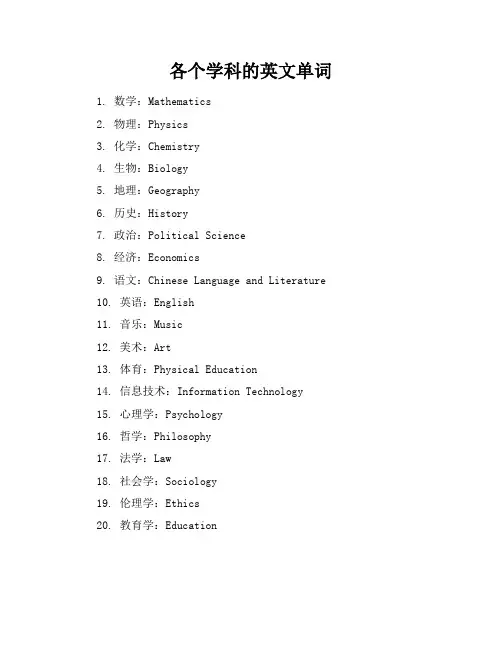
各个学科的英文单词1. 数学:Mathematics2. 物理:Physics3. 化学:Chemistry4. 生物:Biology5. 地理:Geography6. 历史:History7. 政治:Political Science8. 经济:Economics9. 语文:Chinese Language and Literature10. 英语:English11. 音乐:Music12. 美术:Art13. 体育:Physical Education14. 信息技术:Information Technology15. 心理学:Psychology16. 哲学:Philosophy17. 法学:Law18. 社会学:Sociology19. 伦理学:Ethics20. 教育学:Education这些学科英文单词涵盖了从自然科学到人文社会科学的各个领域,为我们在学习、研究和国际交流中提供了便利。
掌握这些单词,有助于我们更好地了解世界,拓宽视野。
各个学科的英文单词拓展21. 天文学:Astronomy天体物理学:Astrophysics宇宙学:Cosmology22. 地质学:Geology地球物理学:Geophysics水文学:Hydrology23. 生态学:Ecology环境科学:Environmental Science野生动物保护:Wildlife Conservation24. 计算机科学:Computer Science软件工程:Software Engineering25. 工程学:Engineering机械工程:Mechanical Engineering电子工程:Electrical Engineering26. 医学:Medicine内科学:Internal Medicine外科学:Surgery27. 护理学:Nursing成人护理:Adult Nursing儿科护理:Pediatric Nursing28. 建筑学:Architecture城市规划:Urban Planning室内设计:Interior Design29. 语言学:Linguistics语音学:Phonetics语义学:Semantics30. 跨学科研究:Interdisciplinary Studies文化研究:Cultural Studies全球研究:Global Studies了解这些学科的英文单词及其细分领域,不仅有助于我们在学术道路上不断前行,还能让我们在全球化的今天,更好地与国际同行交流与合作,共同推动人类文明的进步。
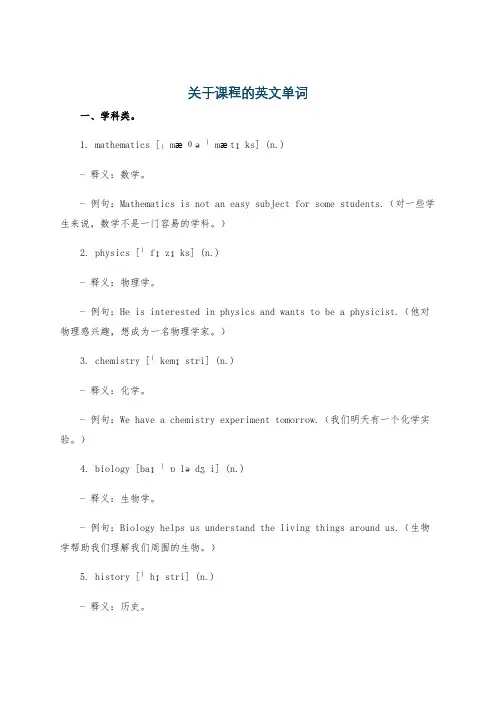
关于课程的英文单词一、学科类。
1. mathematics [ˌmæθəˈmætɪks] (n.)- 释义:数学。
- 例句:Mathematics is not an easy subject for some students.(对一些学生来说,数学不是一门容易的学科。
)2. physics [ˈfɪzɪks] (n.)- 释义:物理学。
- 例句:He is interested in physics and wants to be a physicist.(他对物理感兴趣,想成为一名物理学家。
)3. chemistry [ˈkemɪstri] (n.)- 释义:化学。
- 例句:We have a chemistry experiment tomorrow.(我们明天有一个化学实验。
)4. biology [baɪˈɒlədʒi] (n.)- 释义:生物学。
- 例句:Biology helps us understand the living things around us.(生物学帮助我们理解我们周围的生物。
)5. history [ˈhɪstri] (n.)- 释义:历史。
- 例句:History is full of interesting stories.(历史充满了有趣的故事。
)6. geography [dʒiˈɒɡrəfi] (n.)- 释义:地理学。
- 例句:Geography includes the study of landforms and climates.(地理学包括对地形和气候的研究。
)7. English [ˈɪŋɡlɪʃ] (n.)- 释义:英语。
- 例句:English is an international language.(英语是一门国际语言。
)8. Chinese [ˌtʃaɪˈniːz] (n.)- 释义:汉语;语文(学科)。
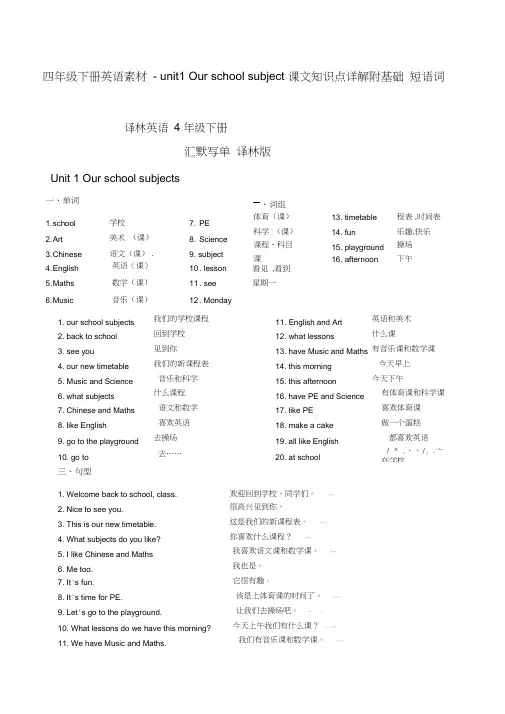
四年级下册英语素材- unit1 Our school subject 课文知识点详解附基础短语词汇默写单译林版Unit 1 Our school subjects一、单词1. s chool 学校7. PE2. A rt 美术(课)8. Science3. C hinese 语文(课) . 9. subject4. E nglish 英语(课)10 . lesson5. M aths 数学(课)11 . see6. M usic 音乐(课)12 . Monday —、词组体育(课)13. timetable 程表,时间表科学(课)14. fun 乐趣,快乐课程、科目15. playground 操场课16. afternoon 下午看见,看到星期一1. our school subjects 我们的学校课程11. English and Art 英语和美术2. back to school 回到学校12. what lessons 什么课3. see you 见到你13. have Music and Maths 有音乐课和数学课4. our new timetable 我们的新课程表14. this morning 今天早上5. Music and Science 音乐和科学15. this afternoon 今天下午6. what subjects 什么课程16. have PE and Science 有体育课和科学课7. Chinese and Maths 语文和数学17. like PE 喜欢体育课8. like English 喜欢英语18. make a cake 做一个蛋糕9. go to the playground 去操场19. all like English 都喜欢英语10. go to 去……20. at school/ * .、、/. L亠在学校三、句型1. Welcome back to school, class. 欢迎回到学校,同学们。
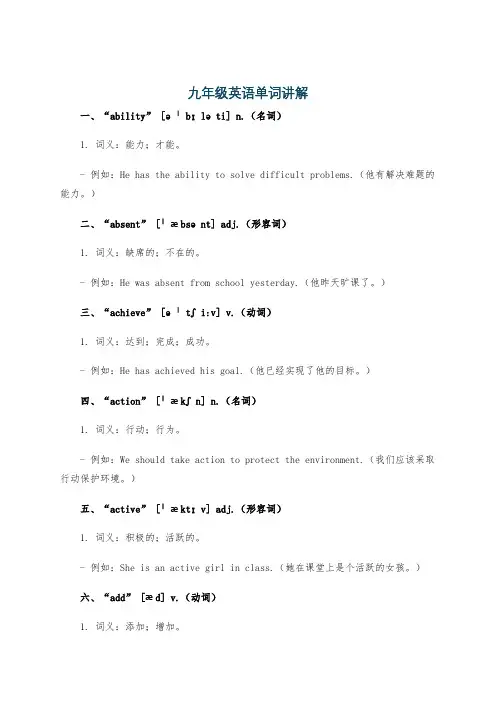
九年级英语单词讲解一、“ability” [əˈbɪləti] n.(名词)1. 词义:能力;才能。
- 例如:He has the ability to solve difficult problems.(他有解决难题的能力。
)二、“absent” [ˈæbsənt] adj.(形容词)1. 词义:缺席的;不在的。
- 例如:He was absent from school yesterday.(他昨天旷课了。
)三、“achieve” [əˈtʃi:v] v.(动词)1. 词义:达到;完成;成功。
- 例如:He has achieved his goal.(他已经实现了他的目标。
)四、“action” [ˈækʃn] n.(名词)1. 词义:行动;行为。
- 例如:We should take action to protect the environment.(我们应该采取行动保护环境。
)五、“active” [ˈæktɪv] adj.(形容词)1. 词义:积极的;活跃的。
- 例如:She is an active girl in class.(她在课堂上是个活跃的女孩。
)六、“add” [æd] v.(动词)1. 词义:添加;增加。
- 例如:Add some salt to the soup.(往汤里加些盐。
)七、“address” [əˈdres] n.(名词)/v.(动词)1. 作为名词:地址。
- 例如:Please write down your address.(请写下你的地址。
)2. 作为动词:演说;向……说话。
- 例如:He will address the meeting tomorrow.(他明天将在会议上发言。
)八、“advantage” [ədˈvɑ:ntɪdʒ] n.(名词)1. 词义:优点;优势。
- 例如:His height gives him an advantage in basketball.(他的身高在篮球方面给他一个优势。
初中英语名词讲解及其练习-初中教育精选编辑整理:尊敬的读者朋友们:这里是精品文档编辑中心,本文档内容是由我和我的同事精心编辑整理后发布的,发布之前我们对文中内容进行仔细校对,但是难免会有疏漏的地方,但是任然希望(初中英语名词讲解及其练习-初中教育精选)的内容能够给您的工作和学习带来便利。
同时也真诚的希望收到您的建议和反馈,这将是我们进步的源泉,前进的动力。
本文可编辑可修改,如果觉得对您有帮助请收藏以便随时查阅,最后祝您生活愉快业绩进步,以下为初中英语名词讲解及其练习-初中教育精选的全部内容。
课时(一)名词讲解一、名词的分类二、名词的数名词分为可数和不可数名词。
物质名词与抽象名词一般属于不可数名词,它们只有单数形式;个体名词和集体名词一般是可数名词,通常有单数和复数两种形式。
1. 单数变复数的规则【注】① ch读/k/时,其复数形式应加s,如stomachs(胃,腹部)② 常见的以o结尾要加es的有如:hero, Negro, tomato, potato, mango,可记为“黑人英雄爱吃两菜一果"。
③ 以f或fe结尾变f或fe为ves的词有如下:妻子拿刀去宰狼,小偷吓得着了慌,躲进架子保己命,半片树叶遮目光。
2。
不规则复数形式teacher – men teachers,_____________________(男医生) - _____________________(女职员);② 不规则复数形式的记忆口诀:男女警察英法人,都是将man变成men。
脚、牙oo变ee,child加上ren。
鹿和绵羊是一家,单变复时不变化.3. “某国人”的复数形式“中日不变英法变,其余s加后边”, news三、名词所有格在英语中,特别是表示有生命的名词,可以加’s表示所属关系,名词的这种形式我们称之为名词的所有格。
1。
有生命的名词所有格(1)单数名词的所有格加’s.如:母亲节__________________ 朱迪的办公室_________________(2)以s结尾的复数名词所有格只加’。
各学科的英语单词各学科的英语单词:Chinese语文、English英语、Japanese日语、mathematics数学、science理科、gymnastics体育、history历史、algebra代数、geometry几何、geography地理、biology生物、chemistry化学、biochemistry生物化学、physics物理、physical geography地球物理、literature文学等。
一、mathematics英[ˌmæθə'mætɪks] 美[ˌmæθə'mætɪks]n. 数学1、mathematics的意思是“数学”,是研究数字、数量和形状的科学,包括“算术、代数、几何”等学科。
其前一般不用冠词。
2、mathematics单复数同形,但指作为一个科学分支“数学”或作为一个学科的“数学”时,句中谓语动词要用单数形式; 如果是用来指这门学科中的具体内容或数学实践能力时,如“数学能力”“数学成绩”“数学应用”“计算能力”“运算结果”等,则动词要用复数形式。
二、history英 ['hɪstri] 美 ['hɪstri]n. 历史;历史学;对过去事情的记载;过去的事1、history主要指过去确实存在和发生过的具有重大意义或深远影响的事件与人物的总和,即“历史”也可指对“历史”进行研究、剖析、总结的一门学科,即“历史学”。
2、当把对过去的事件作为整体看待时, history是不可数名词;当history指过去事件的系统叙述时是可数名词,可加不定冠词a,也可有复数形式。
作“历史学”解时前不加冠词,特指学校的课程或考试的科目时首字母可大写。
3、history还可表示“经历”“履历”“来历”,指过去发生的事件或经验,引申还可指“不复相关或不再重要的事实”。
三、science英 ['saɪəns] 美 ['saɪəns]n. 科学;学科;理科;自然科学;专门技巧1、science的基本意思是“科学”,指通过观察或实验来反映自然、社会、思维等的客观规律的分科的知识体系,是不可数名词。
Unit 2 what's the matter?1.matter1)n. 事情,问题,差错例一:What's the matter with you ?你怎么啦?例二:This is a matter I know little about.这件事我不太知道。
2)vi. 要紧,有关系例一:It doesn't matter at all.一点都没有关系。
例二:It doesn't matter throwing away the picture.把那幅画扔掉, 不要紧。
3)相关短语a) as a matter of fact 事实上;实际上例一:As a matter of fact, he is several inches taller than his father.事实上,他比他的父亲高了好几英尺。
例二:As a matter of fact, we were having a private conversation in here.实际上,我们在这里进行一场私人谈话。
b) no matter 不论,不管例一:No matter when or where i won't desert you .不管何时何地,我都不会抛弃你。
例二:No matter how hard the teacher tried,the boy couldn't enjoy English .无论老师怎么努力,这个男孩还是不喜欢学习英语。
2.hear1)vt. 听见例一:He heard voices in the garden.他听见从花园里传来的声音。
例二:I heard the news on the radio this morning.我今天早上听了新闻广播。
2)vi. 听说例一:A deaf person can't hear.耳聋者听不见。
各科科目的英语单词。
课程科目的英语单词英语作为国际通用语言,在各个领域中都有广泛的应用,尤其在教育领域中更是不可或缺的一门功课。
为了帮助大家更好地学习英语,掌握各个科目的专业词汇,我为您整理了以下各科科目的英语单词,希望对您有所帮助。
1. 数学 (Mathematics)- 加法 (Addition)- 减法 (Subtraction)- 乘法 (Multiplication)- 除法 (Division)- 相等 (Equality)- 不等 (Inequality)- 四则运算 (Arithmetic)- 几何 (Geometry)- 代数 (Algebra)- 概率 (Probability)- 统计学 (Statistics)- 数据分析 (Data analysis)2. 物理 (Physics)- 力 (Force)- 质量 (Mass)- 加速度 (Acceleration)- 速度 (Velocity)- 能量 (Energy)- 功率 (Power)- 重力 (Gravity)- 光学 (Optics)- 音响 (Acoustics)- 电磁学 (Electromagnetism)- 分子物理学 (Molecular Physics)- 热力学 (Thermodynamics)3. 化学 (Chemistry)- 元素 (Element)- 化合物 (Compound)- 分子 (Molecule)- 反应 (Reaction)- 酸碱度 (pH)- 氧化还原 (Redox)- 离子 (Ion)- 摩尔质量 (Molar mass)- 气体 (Gas)- 溶液 (Solution)- 电解质 (Electrolyte)- 化学平衡 (Chemical equilibrium) 4. 生物学 (Biology)- 细胞 (Cell)- 遗传 (Genetics)- 进化 (Evolution)- 生物多样性 (Biodiversity)- 基因 (Gene)- 呼吸系统 (Respiratory system)- 循环系统 (Circulatory system)- 消化系统 (Digestive system)- 生态系统 (Ecosystem)- 内分泌系统 (Endocrine system)5. 历史 (History)- 文明 (Civilization)- 太阳神 (Sun god)- 法老 (Pharaoh)- 帝国 (Empire)- 世界大战 (World War)- 革命 (Revolution)- 独立 (Independence)- 殖民地 (Colony)- 国家 (Nation)- 领土 (Territory)- 皇帝 (Emperor)- 冷战 (Cold War)6. 地理 (Geography)- 大陆 (Continent)- 海洋 (Ocean)- 河流 (River)- 山脉 (Mountain range)- 气候 (Climate)- 自然资源 (Natural resources)- 活动板块 (Tectonic plates)- 首都 (Capital)- 城市 (City)- 地球环境 (Earth's environment)- 地形 (Topography)- 农业 (Agriculture)7. 政治 (Political Science)- 政府 (Government)- 民主 (Democracy)- 独裁 (Dictatorship)- 选举 (Election)- 政治体制 (Political system)- 政治理念 (Political ideology)- 国际关系 (International relations) - 政党 (Political party)- 宪法 (Constitution)- 经济体制 (Economic system)- 社会福利 (Social welfare)- 军事 (Military)8. 文学 (Literature)- 作者 (Author)- 诗歌 (Poetry)- 小说 (Novel)- 戏剧 (Drama)- 散文 (Prose)- 传记 (Biography)- 文学作品 (Literary works)- 文学流派 (Literary genre)- 文学评论 (Literary criticism)- 文学史 (Literary history)- 文学奖 (Literary award)- 典籍 (Classics)以上是各个科目的一些英语单词,他们是各个科目中非常重要的基础词汇,希望能对您的英语学习有所帮助。
Unit 5 Animals in danger学问点讲解【重点词汇】1.anyone 任何人2.bamboo 竹子3.black rhino 黑犀牛4.danger 危急5.dig 挖(土),掘(洞)6.dirty 肮脏的7.few 很少的8.fur 毛皮9.grass 草地10.have a look 看,瞧11.horn (牛、羊等头上的)角12.kill 杀死13.kingfisher 翠鸟14.leaf 叶子15.medicine 药,药物16.mud 泥,烂泥17.nest 鸟巢,鸟窝18.part 部分19.precious 贵重的,贵重的20.rhino (非正式)犀牛21.riverbank 河岸22.save 救,挽救23.so 如此,如是24.South China Tiger 华南虎25.sweet 可爱的26.web 网络27.work 工作;事情28.yesterday 昨天【重点句型】1.It lives on a farm. 它住在一个农场。
2.Has it got four legs? 它有四条腿吗?3.Does it eat other animals? 它吃其他动物吗?4.Is it smaller than a horse? 它比马小吗?5.Kingfishers are in danger. 翠鸟有危急。
6.There are no fish in them, so there is no food for the kingfishers. 里面没有鱼,所以翠鸟没有食物。
7.When people change the rivers and build new riverbanks, there is no quite place for birds to make holes for their nests. 当人们转变河流,建筑新的河岸时,就没有鸟类筑巢的地方了。
常用学科课程单词考点讲解与练习
一、常用学科类单词释义
Subject(lesson):学科、课程;Chinese:汉语,语文;Maths:数学;English:英语;Art:美术;Music:音乐;PE:体育;Science:科学;Physics:物理;Chemistry:化学;Politics:政治;History:历史;Geography:地理;Biology:生物;Computer:电脑。
二、动名词(V+ing)+lesson表达课程
dancing lesson:舞蹈课;cooking lesson:烹饪课;swimming lesson:游泳课;running lesson:跑步课;drawing lesson:画画课;fishing lesson:钓鱼课;reading lesson:阅读课。
三、形容课程内容的英语表达
Interesting:有趣的;boring:无聊的;exciting:令人激动的;difficult/hard:困难的;easy:容易的;good/great/wonderful:好的,极好的;bad:差劲的;popular:受欢迎的。
四、考点演练
(一)英汉互译
1、我在星期天有一节游泳课。
(汉译英)
2、她每周都有2节舞蹈课。
(汉译英)
3、我星期六没有课。
(汉译英)
4、吉姆喜欢数学和语文。
(汉译英)
5、We don’t have any lessons on Friday.(英译汉)
6、She has five lessons in the morning.(英译汉)
7、I like Chinese best.(英译汉)
8、The reading lesson is boring.(英译汉)
(二)句型转换
1、I have a PE lesson today.(改为一般疑问句)
2、She has an Art lesson in the morning.(改为否定句)
3、We have some reading lesson.(改为一般疑问句)
4、The English lesson is interesting.(对划线部分提问)
5、I like Chinese and Maths.(对划线部分提问)
6、He has English lessons.(对划线部分提问)。